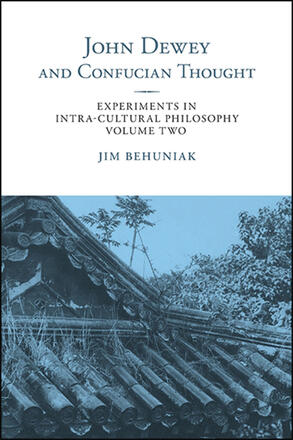
John Dewey and Confucian Thought
Experiments in Intra-cultural Philosophy, Volume Two
Alternative formats available from:
Assesses John Dewey’s visit to China in 1919–21 as an “intra-cultural” episode and promotes “Chinese natural philosophy” as a philosophical context in which to understand the connections between Dewey’s philosophy and early Confucian thinking.
Description
In this conclusion to his two-volume series, Jim Behuniak builds upon the groundbreaking work begun in John Dewey and Daoist Thought in arguing that "Chinese natural philosophy" is the proper hermeneutical context in which to understand early Confucianism. First, he traces Dewey's late-period "cultural turn" in more detail and then proceeds to assess Dewey's visit to China in 1919–21 as a multifaceted "intra-cultural" episode: one that includes not only what Dewey taught his Chinese audiences, but also what he learned in China and what we stand to learn from this encounter today.
"Dewey in China" provides an opportunity to continue establishing "specific philosophical relationships" between Dewey and Confucian thought for the purpose of getting ourselves "back in gear" with contemporary thinking in the social and natural sciences. To this end, Behuniak critically assesses readings of early Chinese thought reliant on outdated Greek-medieval assumptions, paying particular attention to readings of early Confucianism that rely heavily on Western virtue ethics, such as the "Heaven's plan" reading. Topics covered include education, tradition, ethics, the family, human nature, and religiousness—thus engaging Dewey with themes generally associated with Confucian thought.
Jim Behuniak is Professor of Philosophy at Colby College. He is the author of John Dewey and Daoist Thought: Experiments in Intra-cultural Philosophy, Volume One and Mencius on Becoming Human, both also published by SUNY Press.
Reviews
"John Dewey and Confucian Thought demonstrates vividly how real problems and experience during and after his visit to China shaped Dewey's 'cultural turn.' … The richly textured and engaging book draws extensively on Dewey's correspondences, his collected works, the recently discovered notes of his lectures on social and political philosophy in China, pre-Qin Confucian texts, especially the Analects and the Mencius, recently excavated ancient Chinese texts, relevant secondary literature, as well as scientific and social scientific studies on various subjects." — Journal of Chinese Philosophy
"With this two-volume set, Behuniak has produced an exemplary work of intra-cultural philosophy. The dynamic interplay between Dewey's and Confucian/Daoist philosophies percolates spiritedly in its pages, the contemporary relevance of the exchange never in doubt. Behuniak's meticulous scholarship leaves no stone unturned, while his incisive analyses offer critical and productive contributions to ongoing dialogues. There is much to be gained from this book; I would recommend it highly to anyone." — Mathew A. Foust, Reading Religion
"Naturally, the two volumes can and perhaps ought to be read separately since they stand firmly on their own footings and provide ample opportunity for learning and reflection. Nevertheless, as one is complementary to the other, it is recommended that the reader who wishes to invest in a layered understanding of how pragmatism and democratic commitments could be harmonized with Daoist spontaneity and Confucian ritualism read both of them. This way one comes to fully appreciate the complete picture that is depicted masterfully by Behuniak." — Religious Studies Review
"Attacking the distinction of Eastern versus Western philosophical cultures, these volumes create a detailed intra-cultural Deweyan-Chinese thought on many levels at once. Using Dewey to reinterpret the Daoist and Confucian traditions from their sources, Behuniak weaves an intra-cultural philosophical trajectory that stretches from the sixth-century BCE China to Columbia University in New York City. The result is one of the philosophical masterpieces of our time." — Robert Cummings Neville, Professor Emeritus of Philosophy, Religion, and Theology, Boston University